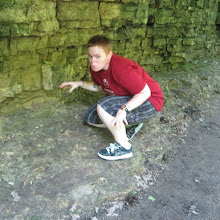Recently, I picked up a copy of
No Plot? No Problem!, a rather neat little bundle of encouragement directed toward those brave souls who take on the National Novel Writing Month challenge of writing a 50,000 word novel in each November. (Otherwise known as
NaNoWriMo.) I didn't participate this past year because I was concentrating on short stories rather than longer works, plus building my
Freeze Ray. The book is great for pumping you up to dive headfirst into a ridiculously long draft of something you may never look at again, but it feels pretty wonderful to churn out so much work in such a short time. If you find you are slow when drafting work (i.e. does it take you a year to write twenty-five pages? congratulations, you are me!) then NaNoWriMo is a great exercise for you to try.
The book comes with a few quick exercises to help you suss out this whole writing thing. One exercise I enjoyed was to list all of the things you think make good stories and all of the things you think make bad ones. Of course, I'd like to try to be a smidgen more objective by using the terms "weak" and "strong" instead of "good" and "bad," no matter how fruitless it may be to try to keep personal opinions objective. So here is my list:
18 Things that Make Weak Stories
1. Too much "romance". (I don't know why that word is wrapped in quotations in my notebook.) Look, I know love makes the world go 'round and all that, but throwing in a worn out love story subplot can really sap attention away from your main point and just drag the whole thing down into a sugar-sweet mess of "I am going to save this world...but only cuz you're in it and I got a thing for you something awful, baby." There are a million reasons people do the things they do, and boiling it all down to "love" is oversimplifying it.
2. Boring characters. Ummmm....how to avoid boring characters? I would say give them unique quirks, but I do believe that is noted somewhere later on this list as being a no-no. I suppose Cliched Characters could substitute here. I want to read about raw, gritty, emotionally fragile, unpredictably damaged people, not archetypes.
3. Cliched or unrealistic dialogue. Especially when someone is obviously trying to write hip language. Remember
Dawson's Creek? Kevin Williamson may have intended to write kids who are intelligent and not talk down to his audience, but he sacrificed authenticity for these aims. Let's see if I can think of someone who really knows how to write dialogue...let's think....hmmm...who could it be...could it be ....
Satan? I mean, uh,
Joss Whedon, oh yes, that guy again. Also
Tine Fey did a good job with
Mean Girls. I point out movies and television as examples because it's all about how you hear the dialogue, and thinking in this way allows me to better avoid the pitfalls of cliche. Word.
4. Too many characters. It's awesome you have all these wonderful people with whom you want to populate the landscape of your story, but be careful how many you throw at me and how fast. I want to remember more than their names, and I want each of them to have a meaningful presence in the story.
5. Unimaginative names. Some of the worst character names in contemporary genre fiction: Sookie Stackhouse; Bella Swan; any hard-boiled detectives named Jack, John, or Jake. This doesn't mean you should go out and name your character
Dickie Moorcock, but come on, get creative! I must admit, though, that I do overstep my bounds with this one on occasion; I have a character named Placenta Vagina Female Smith. He's a real great guy.
6. Dense setting description. This can be a tough balancing act, but all I really need is a sense of temporal and spatial place and we're good to go. Unless the setting has some bearing on the psychological make-up or behavior of a character, or is written in a particularly beautiful way, it just does not need to go on longer than a few paragraphs (and sometimes that can be too much).
7. Lack of figurative language. I find this most annoying in young adult novels. They spell everything out for you. I understand reading comprehension grows in stages, but come on - let the teens work a few things out for themselves. YA is not the only fiction that does this (and not all YA does this), mind you. But there's something called subtlety that is sorely lacking in many of today's most popular titles.
8. Forcibly quirky characters. When you have to stick the nosy neighbor lady with twelve cats and a penchant for wandering outside in her knickers in there, for cheap laughs or to buff up your word count, it's just...it's just time to reconsider. Now if she knows the secret formula for the viral infection that's spreading rampant through the city and the only way to protect this knowledge from the evil Martians is by harboring said twelve cats and performing odd knickers-only rituals by moonlight, then okay, leave it in. But don't do it just to do it.
Check back later in the week (or next week) for
Part 2



